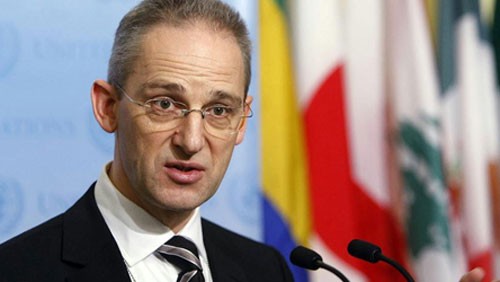(VOVworld) – The tense relationship between the two Koreas has heightened following a series of tough words and actions from both sides. The situation on the Korean peninsula is dire and a clash appears unavoidable if both sides don’t calm down. VOV editor Hong Van analyzes the challenges to the inter-Korean relationship.

UN spokesman Martin Nesirky says the armistice on the Korean peninsula doesn’t allow unilateral withdrawal. (Photo: UN)
|
An 11-day joint military exercise between the US and South Korea, codenamed “Key resolve” and involving 13,000 soldiers as well as warplanes, and guided-missile destroyers was denounced by Pyongyang as a South Korean invasion backed by the US. The annual exercise is taking place simultaneously with another US-South Korea joint military exercise, Foal Eagle, which began on March 1 and will last 2 months.
In retaliation, North Korea on Monday unilaterally announced it was canceling the Armistice that was signed to end the Korean war in 1953. The Rodong Sinmun, the mouthpiece of North Korea’s Workers’ Party, confirmed that Pyongyang has readied its weapons for war and has cut off a Red Cross hotline with South Korea. During visits to border artillery units on Monday, leader Kim Jong-un threatened to destroy South Korea’s Baengnyeong island, which is located in a disputed sea area. Kim said the island will be the first target if military tension continues to escalate. He put his armed forces on high alert.
The two Koreas have never signed a bilateral peace agreement, but North Korea’s unilateral withdrawal from the armistice raises great international concern. In his latest statement, Martin Nesirky, a spokesman for the UN Secretary General, said the armistice on the Korean peninsula remains valid because it was approved by the UN General Assembly and doesn’t allow unilateral withdrawal. South Korean President Park Geun-hye has vowed to deal firmly with any North Korean provocation but will not give up efforts to negotiate with Pyongyang. Defense Ministry spokesman Kim Min-seok warned that South Korea will retaliate if North Korea attacks.
Meanwhile, the West, led by the US, has imposed further sanctions on North Korea and is considering forming a Committee to Investigate Human Rights in North Korea.
North Korea’s tough actions aim to consolidate public support for young leader Kim Jong-un. It also shows North Korea’s determination to overcome bigger challenges and hope for other countries to make concessions and provide what it wants.
The Korean peninsula seems on the brink of a nuclear war. But a war will not benefit both sides. It would trigger a domino effect and a regional arms race that would change the regional political situation.